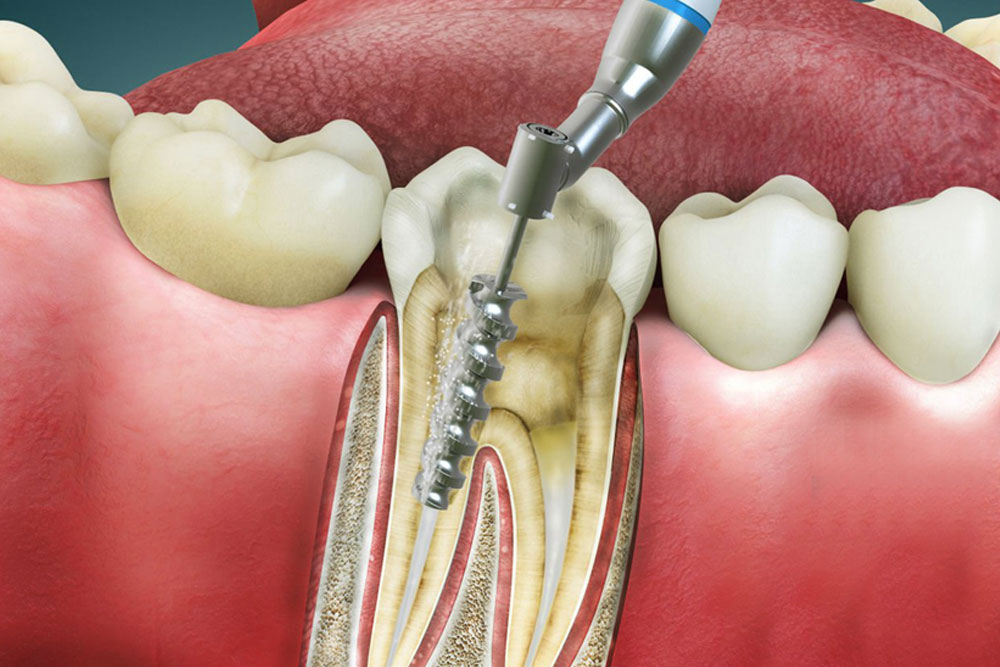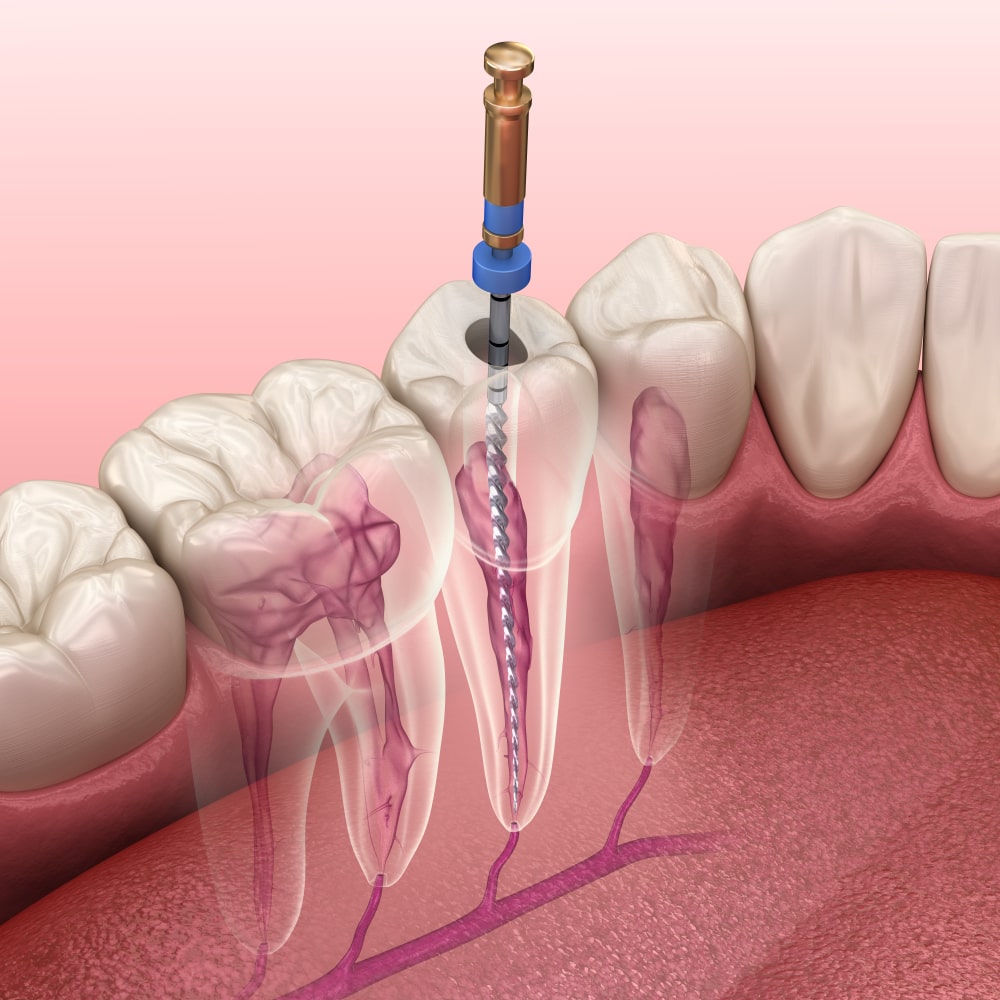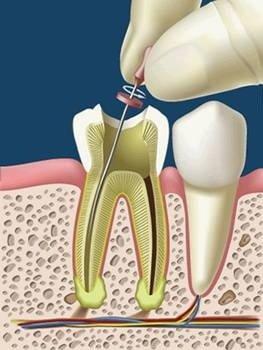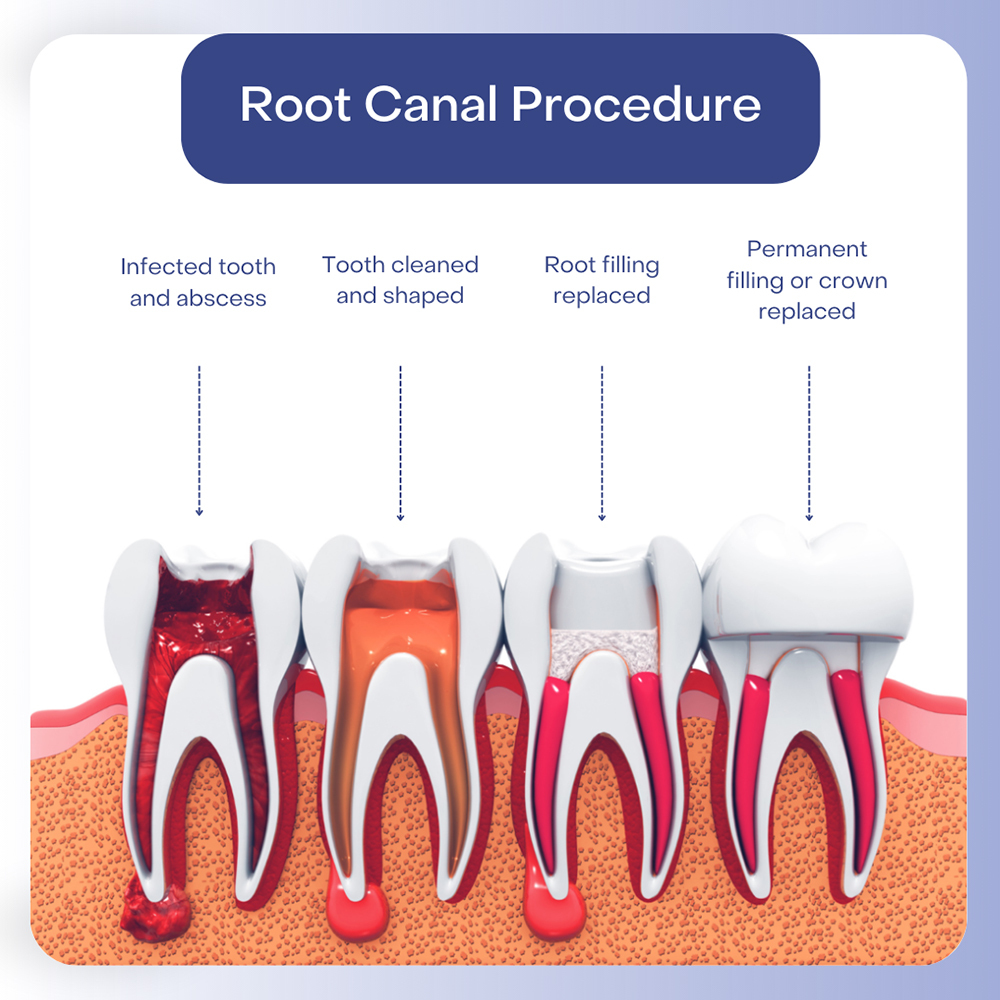Root Canal Treatment | Endodontics or Root Canal Therapy?
Root canal treatment, also known as endodontics or root canal therapy, is a specialized dental procedure designed to save a damaged or infected tooth. This treatment involves removing the infected or damaged pulp, disinfecting the canals, and filling them to restore the tooth’s normal function. Below, we provide all the essential information about this procedure.

Endodontics, Root Canal, or “Asb Kashi”?
All three terms refer to the same treatment, but their usage varies depending on language and audience type:
“Asb Kashi” (Nerve Removal):
- Common term in Persian.
- Widely used among the general public.
- Focuses on the removal of the tooth’s nerve or pulp.
Root Canal Treatment (RCT):
- More scientific term commonly used by dentists and specialists.
- Emphasizes the complete treatment of root canals, beyond just nerve removal.
Root Canal (English Term):
- Used in international dental literature and scientific contexts.
- Sometimes applied when explaining the procedure to patients familiar with technical language.

Appointment booking
Difference in Usage:
“Asb Kashi” (Nerve Removal):
- Focuses on a specific part of the treatment (the pulp) and is explained in simpler terms.
- Suitable for general audiences, as it is straightforward and commonly understood.
Root Canal Treatment:
- Reflects all stages of the procedure (including cleaning, shaping, and filling of the canals).
- More precise and scientific, making it ideal for specialized environments.
Root Canal (English Term):
- Commonly used in English texts and discussions.
- Appropriate for patients and professionals familiar with technical dental terminology.
For general audiences, “Nerve removal” is more relatable, while “Root Canal Treatment” is preferred in professional contexts for its comprehensive and scientific description.
What is Root Canal Treatment?
Root canal treatment, scientifically known as “endodontics,” is one of the most sensitive and specialized procedures in dentistry. This method is performed to save a tooth whose pulp (the soft tissue inside the tooth containing nerves and blood vessels) has been damaged or infected.
Goals of Root Canal Treatment:
- Removal of the Damaged or Infected Pulp: Prevents further complications within the tooth.
- Stopping the Spread of Infection: Protects surrounding tissues from infection.
- Preserving the Natural Tooth: Avoids tooth extraction and maintains its function.

Signs You May Need Root Canal Treatment
If the pulp of your tooth is damaged or infected, you might experience the following symptoms:
- Severe and Persistent Pain: Constant or recurring toothache.
- Prolonged Sensitivity to Heat and Cold: Discomfort that lingers even after exposure to temperature changes.
- Swelling and Gum Inflammation: Around the affected tooth.
- Tooth Discoloration: A darkened or gray appearance of the tooth.
- Presence of Abscess or Gum Infection: Often accompanied by pus discharge and bad breath.
If you notice any of these symptoms, it’s essential to see a dentist promptly. Root canal treatment can save your tooth and prevent the infection from spreading.
Stages of Root Canal Treatment
Root canal treatment involves several specialized steps carefully performed by a dentist. These stages include:
Precise Diagnosis:
- Reviewing the patient’s symptoms such as pain, sensitivity, and swelling.
- Conducting radiographs to detect infection, root fractures, or lesions around the root.
Sterilization and Infection Control:
- Utilizing strict sterilization techniques to prevent infection spread.
- Isolating the tooth with a rubber dam to maintain a sterile environment.
Cleaning the Canals:
- Completely removing the damaged or infected pulp from the root canals.
- Washing the canals with disinfectant solutions (e.g., sodium hypochlorite).
Shaping the Canals:
- Using manual and rotary tools to clean and evenly shape the canals.
- Measuring canal lengths with an apex locator and radiographs.
Filling the Canals:
- Filling the canals with specific materials like gutta-percha and sealer.
- Ensuring thorough filling to prevent bacterial reinfection.
Restoring the Tooth Crown:
- After root canal treatment, the tooth crown must be restored. This can be done with fillings or crowns to prevent fractures or further damage.
Is Root Canal Treatment Painful?
A common concern among patients is whether root canal treatment causes pain.
Fortunately, this procedure is performed under local anesthesia, ensuring no significant pain during the treatment.
Some sensitivity or discomfort may occur after the procedure, which can be managed with dentist-prescribed painkillers.

Common Issues After Root Canal Treatment
Patients may sometimes experience pain or discomfort following a root canal procedure. These issues can arise due to:
- Inflammation of Surrounding Tissues: Irritation caused during treatment.
- Remaining Infection in the Canals: Incomplete removal of bacteria or damaged tissue.
- Overfilled or Underfilled Canals: Improper filling leading to discomfort or reinfection.
- Cracks or Fractures in the Tooth: Structural damage that affects healing.
- Functional Problems (Occlusion): Issues with chewing due to incorrect bite alignment.
If you encounter any problems after the procedure, consult your dentist promptly for resolution.
Number of Root Canals in Teeth
The number of root canals varies depending on the type and location of the tooth:
Upper Jaw Teeth:
- Anterior Teeth: Typically one canal.
- First Premolars: Usually two canals.
- First Molars: Three roots and commonly four canals.
Lower Jaw Teeth:
- Anterior Teeth: Typically one canal.
- First Molars: Two roots and usually three canals.
Cost of Root Canal Treatment
The cost of root canal treatment depends on several factors, including:
- Number of Root Canals in the Tooth: The more canals, the higher the cost.
- Severity of Damage or Infection: Extensive issues may require more complex procedures.
- Need for Crown or Tooth Restoration: Additional costs for crowns or fillings to protect the treated tooth.
For accurate pricing, it is recommended to consult a dentist directly.
Why Choose Dr. Mazdak Hashemi’s Clinic?
At Dr. Mazdak Hashemi’s clinic, root canal treatments are performed using advanced technologies and by specialized dentists. With a focus on sterilization, precision, and the use of high-quality materials, we strive to provide a comfortable and successful experience for our patients.
If you need root canal treatment or have any questions about it, don’t hesitate to contact us or book your appointment online today.
Contact Us:
📞 +989381556536
📞 +982632802056
📍 Address: Karaj, Haft-e Tir Boulevard, before Sasani, next to the 24-hour pharmacy, Behnam Clinic Building, Ground Floor

